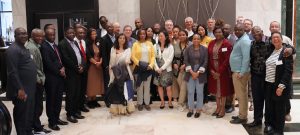As MCT marks 30 Years, Arusha to Host Landmark Pan-African Media Summit: Redefining Journalism's Future

Representatives from media councils across East, West, and Southern Africa, alongside other delegates, convened in Cape Town, South Africa, from May 14 to 17, 2024, to discuss media regulation and self-regulation on the continent. The Press Council of South Africa hosted the meeting.
By Paul Mallimbo
It’s been 18 months since Ernest Sungura took the reins as the Executive Secretary of the Media Council of Tanzania (MCT). But what many may not know is that just 14 months ago, while still navigating his first 100 days in office, he earned yet another major milestone: being appointed as the inaugural Chairperson of the Network of Independent Media Councils in Africa (NIMCA), during a historic gathering in Cape Town, South Africa.
His story is not just one of titles and timelines. It’s a tale of swift impact, regional recognition, and a leadership journey that began at full throttle. From the heart of Tanzania to the continental stage, Ernest‘s rise speaks of a new chapter for media self-regulation across Africa.
NIMCA was officially launched on Thursday, 16 May 2024, at the inaugural meeting of African Media Councils, hosted by the South African Press Council in Cape Town.
In July 2025, beneath the shadows of Mount Meru and the legacy of historic Pan-African gatherings, Arusha will once again take centre stage, this time as the meeting point for Africa’s most influential voices in journalism, policy, and media ethics.
From July 14 to 17, Tanzania will host the International Conference of African Media Councils, a watershed event expected to redefine the landscape of media self-regulation and communication policy across the continent. The venue, the Arusha International Conference Centre (AICC), will serve not just as a physical space, but as a symbolic ground zero for bold conversations about journalism’s future in an age of digital disruption and democratic flux.
At the heart of this grand event is a powerful convergence of leadership, dialogue, and celebration. The President of the United Republic of Tanzania, Dr. Samia Suluhu Hassan, has been officially invited to open the conference, a strong signal of the country’s commitment to press freedom, ethical journalism, and regional cooperation.
Joining her will be Dr. Hussein Ali Mwinyi, President of Zanzibar and Chairman of the Revolutionary Council, who will grace the occasion as a Special Guest, particularly for the celebration marking the 30th anniversary of the Media Council of Tanzania (MCT). Also expected is Dr. Tawfik Jelassi, UNESCO’s Deputy Director General for Communication and Information, adding a global voice to the African dialogue.
But this is no ordinary gathering. It brings together cabinet officials from across the continent, including: Hon. William Kabogo Gitau, Minister of Information and Digital Economy, Kenya, Hon. Prof. Palamagamba Kabudi, Minister of Information, Culture, Arts, and Sports, Tanzania
Others in the list are Hon. Jerry Silaa, Minister of Communication and Information Technology, Tanzania, Hon. Dr. Chris Baryomunsi, Minister of ICT and National Guidance, Uganda, Hon. Cornelius Mweetwa, Minister of Information and Broadcasting, Zambia, and Hon. Veronica M. Nduva, Secretary General of the East African Community
Together, these leaders will deliberate on the evolution of media regulation and how it must adapt not just to technological advances but also to shifting political landscapes, citizen expectations, and threats to journalistic integrity.
The conference is the result of collaboration between the Media Council of Tanzania (MCT), the Network of Independent Media Councils of Africa (NIMCA), and the East Africa Press Councils (EAPC). Alongside the main conference, side meetings of both EAPC and the World Association of Press Councils (WAPC) will further anchor the gathering in global solidarity.
With more than 500 delegates expected, 150 of them from outside Tanzania, this event is not just regional, but continental and intercontinental in reach. It will be governed by a forward-facing theme:
“Advancing Media and Communication Regulations for Journalism Excellence in Africa.”
The agenda itself mirrors the conference’s ambitious intent, where participants will deliberate on dialogues that will unpack the realities confronting journalists today from disinformation and political pressure, to regulatory capture and public distrust, while showcasing how media councils are innovating in the protection of press freedom and public interest.
This remarkable event will provide institutions and companies with an opportunity to showcase technological solutions that are transforming the practice and consumption of journalism, with a focus on digital safeguards, artificial intelligence, citizen engagement, and multilingual platforms.
The 30th Anniversary of the MCT will serve not only as a celebration but also as a moment of introspection, inviting members, academia, and industry veterans to evaluate how far Tanzania has come in establishing journalism as a pillar of democracy, and where it must go next.
The event is being made possible through strategic support from Konrad-Adenauer-Stiftung (KAS) and UNESCO, long-time partners in strengthening media freedom and democratic governance.
